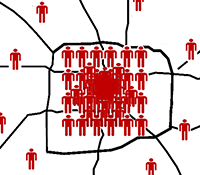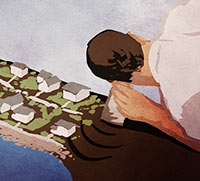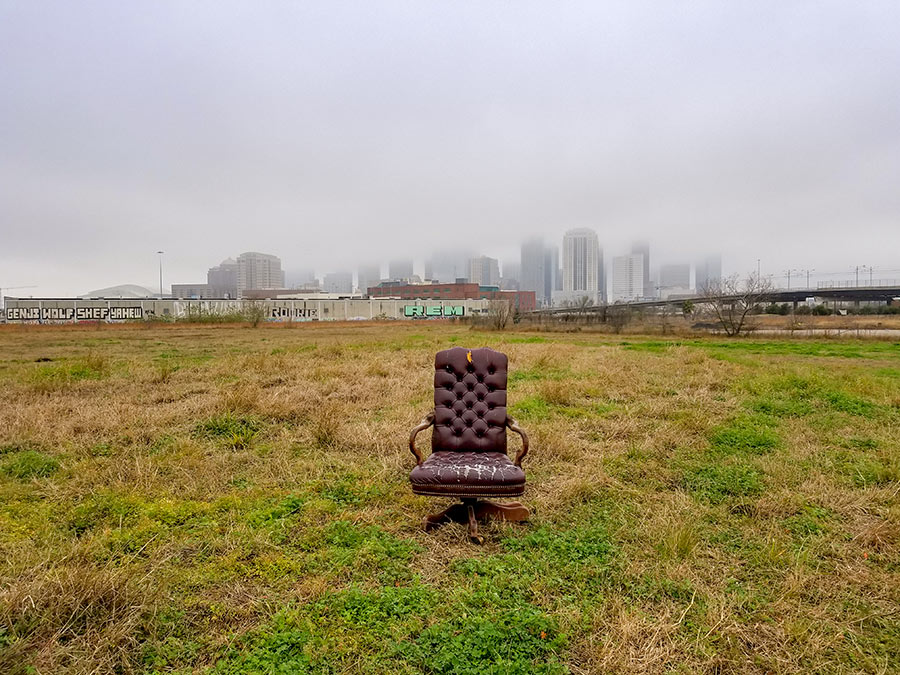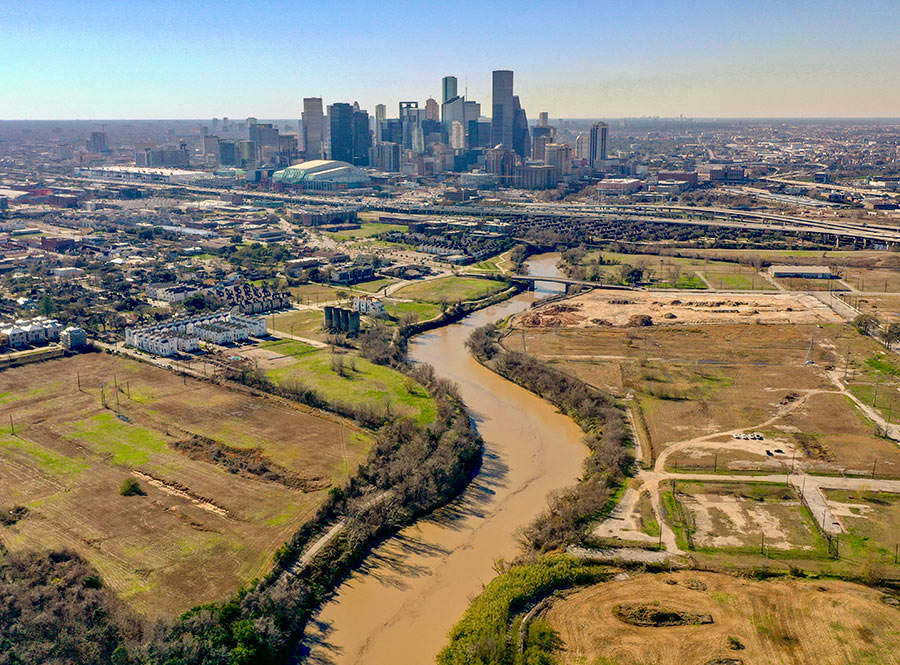COMMENT OF THE DAY: DRAWING A LINE ON URBAN EXPANSION  “Here is a thought: Cities are just too big. Look at Shanghai — great public transit system, but streets are choked with traffic. People on scooters ride almost shoulder to shoulder. People pay over $20k a year for a permit to be able to use the highways because you simply cannot move on the side streets in a passenger car. London has crazy vehicle congestion charges. Overnight garage contracts in NY, Boston, etc. cost as much as a decent sized house in the suburbs. Yet, every city in the US jumps up and down at the idea of growth. Maybe it is time for civic leaders to just tell people to stay away — no room on the roads. Or state legislatures could pass bans on moving to certain metro areas and require people to move to smaller towns/cities to help them revitalize. La Grange is a lovely place. Next time someone tries to move to Austin and choke up I-35 even more, Gov. Abbot could order them to move to La Grange instead.” [Old School, commenting on Comment of the Day: On the Other Side of the Tracks] Illustration: Lulu
“Here is a thought: Cities are just too big. Look at Shanghai — great public transit system, but streets are choked with traffic. People on scooters ride almost shoulder to shoulder. People pay over $20k a year for a permit to be able to use the highways because you simply cannot move on the side streets in a passenger car. London has crazy vehicle congestion charges. Overnight garage contracts in NY, Boston, etc. cost as much as a decent sized house in the suburbs. Yet, every city in the US jumps up and down at the idea of growth. Maybe it is time for civic leaders to just tell people to stay away — no room on the roads. Or state legislatures could pass bans on moving to certain metro areas and require people to move to smaller towns/cities to help them revitalize. La Grange is a lovely place. Next time someone tries to move to Austin and choke up I-35 even more, Gov. Abbot could order them to move to La Grange instead.” [Old School, commenting on Comment of the Day: On the Other Side of the Tracks] Illustration: Lulu





Comment of the day formula: Address obvious problem in big picture but asinine way, invoking foreign countries as superior model and possibly using city planner academic speak for extra brownie points, and close with reference to people in Texas / republican Texas elected officials being idiots despite Houston policies being 100% controlled by left wing politicians and corrupt career politician lobbyist types.
I vaguely remember a Houston mayor in the 70’s – perhaps Louie Welch – who sent out the message to people in Michigan that Houston could not absorb anymore people at the time. I remember a “tent city” out I-10 East. Does anyone else remember this?
Addressing problem, seeing big picture and making comparisons is basically higher-order thinking in a nutshell.
I applaud people who wish to stop Houston from becoming Shanghai V.2, because only new solutions will prevent it!
@mark. I remember the swarm of black license plates on cars from Michigan. That was a huge exodus of people moving here.
“London has crazy vehicle congestion charges. Overnight garage contracts in NY, Boston, etc. cost as much as a decent sized house in the suburbs.”
So car drivers are being forced to pay for the externalities they cause?
If the vast majority of people can move comfortably using public transit and those that want cars are willing to pay for it, why is it a problem?
Why should it be assumed that there’s a god given right to own a car and have it be cheap?
Commenter7:
I liked your formula until you decided to ignore the fact that the state makes a lot infrastructure decisions that are just not in the hands of the city (the mayor just recently spoke to TXDOT about their obsession with spending money widening roads without regard to its efficacy), but also that the city, while it does extend quite far, is not the only municipality or government in the area.
And trust me, these people are not leftists. Corrupt? Yeah, some of them. No more than our state government.
For the record, I found this comment of the day rather reasonable in a Machiavellian sort of way. We really do have too many people pouring into our burg too fast. Too much strain on infrastructure: schools, streets, water systems, you name it.
.
And, while I have no experience living in Shanghai, I certainly don’t want Houston to be its twin. That being said, I don’t mind a line of demarcation with my added mandate being that anyone who hasn’t lived here for the past 15 consecutive years must leave. So, arrived here after 2000? Bye bye. Exceptions could be given after a hearing in front of Obamacare’s “death panels” since they aren’t doing much nowadays, amirite?
Next time you’re stuck in traffic, remember that you are the traffic. Wherever you go, there you are.
Have you not heard of Coruscant? http://starwars.wikia.com/wiki/Coruscant
you can’t really say that cities are too big. if anything, that just means cities aren’t big enough. if people are more than willing to put up with the extreme congestion of shanghai, london or new york and pay exorbitant prices to drive there then that means those cities are still providing a much higher wage, standard of living or a better economic opportunity than they could get in other cities with much less hectic commutes.
.
whats also constantly ignored in these discussions is the impact of highway travel on non-residential users. it’s very important for manufacturing and heavy industry which is a very large part of Houston’s economy. clogged freeways push these companies out of the inner city core, which will happen in time as we become denser, but that’s a long ways off. it would take decades for Houston to get enough density to build mass transit systems that are capable of replacing vehicular traffic and in that time large businesses could continue to relocate to the far suburbs in order to relieve their employees of high commuting times in the inner city and reduce the tax base for the inner city.
.
we obviously need both options, but basically can only afford one at this time until residents decide to either pay more to commute (ie build mass transit infrastructure) or decide to become more urban to reduce their commuting times (and in turn increase the inner city tax base to build infrastructure).
Look at Shanghai.
What’s that? Can’t see it?
Yep, that’s the pollution.
I took this as a ‘modest proposal’ based on the full comment rather than what Swamplot chose to emphasize.
However, I have to say, if your concern is that people will continue to pour into Houston quickly, your concerns are misplaced. You may have noticed that oil prices have declined. This will stem the tide.
Be careful what you wish for.
This is less about the size and population of cities, and more about growth and how it’s handled. Shanghai, the example Old School used, is not the biggest urban agglomeration on earth. Not by a long shot. (That honor goes to Tokyo/Yokohama – with a metrolitan population bigger than that of the State of Texas.)
.
Growth has terrible problems; rapid growth makes those problems worse, and poor planning makes them worse. But the alternative of urban decline is far worse than even rapid, poorly planned growth. It’s easy to complain about traffic and overcrowded schools, higher housing costs and overextended public services. But would you really rather live with a decaying, unused infrastructure that local government can’t afford to maintain, and schools that are shutting down and neglected? Would you rather watch as the tax base erodes and the City government goes defunct? Would you want to sell your house at a steep loss? Not me. Look at Chicago. Look at what Detroit went through. Sure the traffic jams are a thing of the past, but at what cost?
.
One other thing to note is that small cities, and rural areas can struggle with growth, too. Look at what happened in Karnes County when the Eagle Ford Shale boom was going on. They had problems with traffic, dangerous roads, a lack of housing and skyrocketing prices, overcrowded schools…..
Houston is nothing like and will never be anything like Shanghai. Houston = low-density sprawl, with a densifying urban core but limited prospects for more density outside of 610 (since most land is deed-restricted single-family residential). Shanghai = high-density sprawl, 20+ story apartment and housing blocks in every direction as far as the eye can see. It is absolutely an extreme case for density, far beyond anything in the US or Europe.
The U.S. constitution guarantees freedom of movement via the privileges and immunity clause
The state legislature doesn’t have the power to tell people where they can or can’t live. — Which is a good thing.
Be careful what you wish for. Well said Niche.
While the stuff about Gov. Abbott sending people to live in La Grange was just trolling (but not the comment about La Grange being a lovely place, it is a wonderful little town), my comment was raising a serious planning issue. Is there a point where a city just gets too big for any effort to mitigate transportation issues to be anything but wasted money? LA spent a billion on a subway, but traffic just gets worse and worse. Houston spends zillions making roads as wide as they are long and carving light rail lines through neighborhoods, but traffic gets worse and worse. Transportation issues drive up the cost of housing as people will pay handsomely for the privilege of not spending 2-3 hours a day sitting in their car or being crammed into a subway car.
Texas has about 27 million people in a state that is about as big as anything. But about 17 million of those 27 million are crammed into four major metropolitan areas. What if instead of four giant metro areas ranging in size from 2.5-7 million, Texas had 35 smaller cities with around 500,000 people? Or 70 small cities with around 250,000 people? Rural Texas is generally desperately poor as populations have shifted to the major metropolitan areas. Instead of pouring money into mega cities to try to do the impossible, shouldn’t we think about dedicating resources towards encouraging the redevelopment of rural towns and small cities that have been left behind by the giant population centers?
Yes and no, Old School. There has always been a limit on the expansion of cities, governed by the transit technology of the time. Medieval and cities were small, because people had to walk everywhere. Renaissance cities got a little bigger (but not much) because more people ride horses and carts. During the industrial revolution, cities took advantage of streetcars and trains to get much bigger. Postwar cities grew much, much bigger still thanks to the automobile.
.
You’re right that some cities are butting up against the limits imposed by the automobile and other modern modes of transit. Tokyo is one. I would argue that New York City and LA are the only US cities where this is happening today. Houston has a lot of open space to grow into, without having to go beyond the automobile-imposed limit.
.
But, and this is a huge but, the growth limit could expand again if we can ever come up with a new technology for commuting. Driverless cars that can go 70mph with 24″ between them? Or maybe something else? Who knows. But if it’s developed and takes hold, the growth limits imposed by the automobile will go away.
@Old School that would be like asking us to roll back containerization, the Interstate Highway System and the Green Revolution. Technological changes have precipitated the logarithmic increase in urbanization, and the only way to counter that would be heavy-handed regulation which could never exist in our current political climate.
There simply isn’t a reason for most rural areas to have dense developments anymore.
Curious to what the alternative would be? If you do not expand, you stack, but wouldn’t that create more gridlock confined to that core?
6 Billion people scattered in the world, would still be 6 billion people but given the choice to spread out, to me would be a better option than confining them all to one area without expanding. If urban expansion never occurred, then would we still have a large population centralized in one area stacked on top of one another?? Not arguing, but just don’t understand the alternative? Would be great if we had multiple transportation modes that connected people, or each core had everything you needed to negate the need to go back and forth, but that isn’t the reality.
I appreciate the opportunity to personally comment as well as the views of all those who have and continue to post comments.
Technology enables the growth of large cities. It can also enable their disintegration. As more and more work can be done at the end of a fiber optic line, there’s incentive for workers to move out to rural (but wired) communities. Most of the programmers I know are working from home these days. They could do that from any place with a broadband internet connection.
.
They don’t (for the most part) move to farms because they have grown accustomed to the things you will never find in a rural town. Amazon can deliver some of your delicacies, but you need a big city for good arts and entertainment. There is no equivalent of Pass and Provision in La Grange.
Everyone’s legs get broken!
Everybody telecommutes!
Funny I go to Detroit and LA regularly and Detroit is making an impressive comeback. As far as Rapid growth goes, when there is massive rapid growth the infrustructure can’t sustain itself nor grow quick enough. The oil industry in TX on the verge of major collapse and on the other hand fuel manufacturing is growing daily! look at Baytown, la Porte and the general port area. it may have a balance. we will see. Oh and screw the potholes!! Houston needs police and fire growth!!
Thats true Memebag, and I know that you know more or less where I’m writing this comment from and that I am a case in point. But you can take it one further; fiberoptics aren’t the limit. The limit is 3G service, and in a pinch I can make calls using VoIP even on a severely throttled connection. Every now and then I have to make a pilrimage to a high-speed hard line, but mostly I am remote. Hell, I am so remote that I can’t pull better than a kilowatt off the grid without some serious attenuation…and nothing about that makes any difference whatsoever. Most people with desk jobs could pull this off.
Old School, the academic literature that I perused about ten years ago indicated that beyond about the 9 million population threshold that big-city problem severely limit the rate of future growth; however within large sovereign nations where immigration is without significant friction there is usually at least one but possibly two megacities that surpass that and can maintain growth. The second-tier stalls out, such as with Chicago, and the third tier benefits up to the point that the can be considered second-tier. That seemed intuitive. But it was also based on a telecommunications infrastructure that we would now consider primitive. And if transport gets rethought by way of automation…whew, its not just going to be places like La Grange feeling the effects. On that subject too, be careful what you wish for! Add a few thousand commuters as such and places like that will seem a lot less charming. I kind of feel the same way about Houston’s funkier neighborhoods when someone starts talking about how such-and-such policy should be enacted in order to shift development into the city. I ask myself whether that person really thinks that they would appreciate having the actually-real housewives of Kingwood or Baytown in their midst…by the thousands per square mile. Say what you will about policies to de-segregate neighborhhods by race or class, but is a policy that distorts urban geography in a blind radial pattern from an urban core REALLY what anybody at all should want for themselves!? I would be very cautious about that.